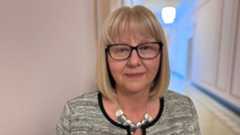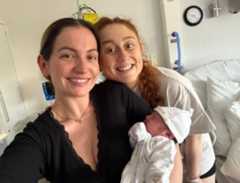Mum travels 80 miles to take her son to 'priceless' cerebral palsy school
'We would be lost without our priceless school'
- Published
Mary Frances Hassard travels from Belfast to Dungannon twice a week so her three-year-old son can attend a specialist school.
Finn has cerebral palsy and goes to the Buddy Bear School.
It's the only school of its kind in Northern Ireland and aims to teach children with cerebral palsy greater movement control.
Ms Hassard said it had "made all the difference in the world" to Finn who struggled with head control and sitting independently before going to Buddy Bear.
"It's given us hope, it's given us excitement for what Finn could potentially be able to do in the future," she added.
The County Tyrone school, which opened in 1993, has made a fresh bid for Stormont funding.
It is an independent special school recognised and inspected by the Department of Education (DE).
However, while a small number of pupils have their places funded by the Education Authority (EA), it relies mainly on fundraising and donations to continue to operate.
Ms Hassard said the school was "priceless" and has provided a "lifeline" for her family.
"It's so holistic, there's such a relaxed approach to everything so Finn isn't always aware that he's doing all this hard work.
"He's just having to learn the basics really that would come naturally to most kids, but because Finn has the condition he has he has to work even harder."
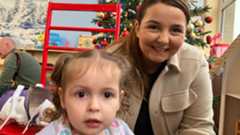
Sarah Frazer's daughter Leah started at Buddy Bear when she was just one-year-old
Sarah Frazer's three-year-old daughter Leah developed cerebral palsy after experiencing a stroke when she was only eight weeks old.
Leah started attending Buddy Bear when she was just over one-year-old.
"At that stage she was barely sitting up by herself and really Buddy Bear has benefited us so much," Ms Frazer told BBC News NI.
"She's learnt to sit independently, she's learnt to crawl here, to roll and now they are even helping with walking.
"Even her wee speech and social skills, we've just seen such an improvement."
Ms Frazer said the school "meant everything" to her family.
"It's vital that they do get funding just so this school can continue and to provide the level of care and service for years to come."
What is cerebral palsy?
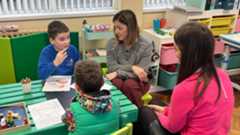
The Buddy Bear School in Dungannon, County Tyrone, opened in 1993
Cerebral palsy is a condition caused by a problem in parts of a baby's brain used to control the muscles.
It can lead to difficulty in walking, sitting, or controlling movement, or speech problems.
Buddy Bear is the only school in Northern Ireland to offer an approach called conductive education, which aims to teach children greater control over their movements.
The school has pupils up to the age of 19 but does not receive core funding for its running costs and staffing like the majority of other schools.
Current funding time-limited
In 2021,it was awarded £1m in funding from the National Lottery Community Fund and the McClay Foundation but that funding is time-limited.
The school has now put forward a proposal for joint funding from the Department of Health (DoH) and Department of Education (DE).
Its proposal said it was seeking support as a specialist centre for children from birth to four years old "with motor, developmental and multi-disciplinary needs".
"Families are waiting longer for physiotherapy, occupational therapy, and speech and language therapy, while early years settings struggle to meet the complex needs of young children requiring consistent, intensive intervention," it said.
"Buddy Bear Trust is uniquely positioned to respond to these growing needs through a holistic, integrated and proven model of early intervention."
Buddy Bear is a 'lifeline'
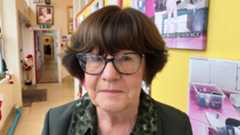
Founder Phyllis Agnew says the school has to raise about two-thirds of its annual running costs
Phyllis Agnew was one of the founders of the Buddy Bear Trust in 1993.
Her son, who is now almost 40, was one of the first children with cerebral palsy to attend the school.
She said the school has to raise about two-thirds of its annual running costs of around £300,000 itself.
"We're an independent school so children who want to attend the school have got to apply to the Education Authority," she said.
"They've got to go through the statementing process because we are a special school."
The school is currently fundraising to get a lift installed as it currently does not have one.
Ms Agnew also said some parents had to go through a legal process to get their child's place funded.

During a visit on Wednesday, the health minister said his department's budget for core funding was constrained.
Visiting the school on Wednesday, the Health Minister Mike Nesbitt said he was very impressed and he had been struck by the parents telling him how their children were thriving.
"It's all about the patience of the staff here, because it's all about repetition followed by more repetition until those behaviours embed themselves in those young children," he said.
However, Nesbitt said his department's budget for core funding was constrained.
"We put £1.8m - and that's a very small percentage of the budget - into the voluntary and community sector," he said.
"I wish it was more, because without organisations like this - without the voluntary, community, social enterprise sector - helping deliver health and social care we would be in enormous trouble.
"So I can give them my support, finding more money at this point is just a challenge too far."
BBC News NI has contacted the Department of Education for a response.
- Published10 December 2021

- Published6 May
